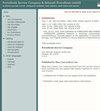Anti-TNP monoclonal antibodies as reagents for enzyme immunoassay (ELISA).
引用次数: 7
Abstract
The aim of this study was to produce anti-TNP monoclonal antibodies (MAbs) that could be conjugated and used for the detection of antigen-antibody reactions, in which the antigen specific-antibody had been previously bound to trinitrophenyl (TNP). For hybridoma production, SP2/0-Ag14 cells were fused with spleen cells from mice previously immunized with TNP-ovalbumin (TNP-OVA). After 10 days, enzyme-linked immunoadsorbent assay (ELISA) was used to detect anti-TNP antibodies in the supernatants, and five cultures were found to be strictly positive for TNP. Three of these were subsequently cloned by limiting dilution, and 15 clones were chosen for expansion based on the criterion of high reactivity against TNP. Anti-TNP MAbs produced by those clones were isotyped as IgG1, and purified by Sepharose-protein G affinity cromatography from ascites developed in BALB/c mice. Two purified MAbs (1B2.1B6 and 1B2.1E12) were coupled to horseradish peroxidase (HRPO). The resulting conjugates were evaluated in ELISA tests for interferon-gamma and interleukin-4 detection, in which the secondary anti-cytokine antibodies were coupled either to TNP or biotin. The performance of anti-TNP conjugates in these assays were compared with a biotin-streptavidin/peroxidase system. Both types of conjugates were similarly able to detect cytokines with r2 (linear correlation coefficient) close to unity value. Growth studies of one of those hybridomas (1B2.1B6) yielded a specific growth rate of 0.042 h(-1) and a doubling time of 16.5 h. Data discussed here show that at least two MAbs against TNP raised in this work can be used as a reagent for enzyme immunoassays.抗tnp单克隆抗体作为酶免疫测定(ELISA)试剂。
本研究的目的是制备抗TNP单克隆抗体(mab),该单克隆抗体可偶联并用于检测抗原-抗体反应,其中抗原特异性抗体先前已与三硝基苯(TNP)结合。为了产生杂交瘤,SP2/0-Ag14细胞与先前免疫过tnp -卵白蛋白(TNP-OVA)的小鼠脾脏细胞融合。10 d后,采用酶联免疫吸附法(ELISA)检测上清液中TNP抗体,5个培养物TNP严格阳性。其中3个随后通过限制稀释克隆,并根据对TNP的高反应性标准选择15个克隆进行扩增。这些克隆产生的抗tnp单抗同型为IgG1,并通过从BALB/c小鼠腹水中提取的Sepharose-protein G亲和层析纯化。两个纯化的单抗(1B2.1B6和1B2.1E12)与辣根过氧化物酶(HRPO)偶联。所得到的偶联物在干扰素- γ和白细胞介素-4检测的ELISA试验中进行了评估,其中二级抗细胞因子抗体与TNP或生物素偶联。在这些实验中,抗tnp偶联物的性能与生物素-链亲和素/过氧化物酶系统进行了比较。两种偶联物检测细胞因子的能力相似,r2(线性相关系数)接近于单位值。其中一个杂交瘤(1B2.1B6)的生长研究显示,其特定生长速率为0.042 h(-1),倍增时间为16.5 h。本文讨论的数据表明,本研究中至少有两个针对TNP的单克隆抗体可以用作酶免疫分析的试剂。
本文章由计算机程序翻译,如有差异,请以英文原文为准。
求助全文
约1分钟内获得全文
求助全文

 求助内容:
求助内容: 应助结果提醒方式:
应助结果提醒方式:


